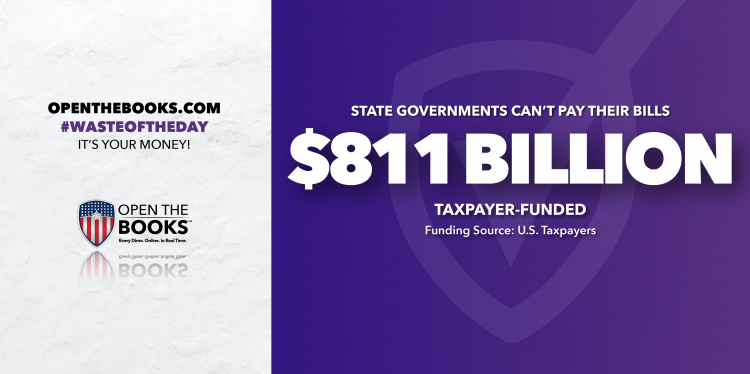Executive
Waste of the Day: States Are $811 Billion In Debt
State governments across the USA have $811 billion in debt that exceeds their assets, mainly from unfunded pension liabilities.

Topline: America’s 50 state governments will need an extra $811 billion to pay off their current debt, according to the annual “State of the States” report from Truth in Accounting.
States do go into debt – er – taxpayer burden
Key facts: State governments had $2.9 billion in debt and only $2.1 trillion in assets at the end of fiscal year 2023, Truth in Accounting, a nonpartisan organization that promotes fiscal transparency and accountability, found. The gap will need to be covered by taxpayers sometime in the future.
Twenty-seven states have “taxpayer burdens,” meaning their budget is not balanced and they would need to collect at least $900 from every person in the state to eliminate their debt. Massachusetts, Illinois, New Jersey and Connecticut received a letter grade of “F” because they would need over $25,000 from every resident to pay their bills.
Only 23 states had what Truth in Accounting calls a “taxpayer surplus,” meaning they could pay off all of their debt and still have money to return to taxpayers. Four states received a letter grade of “A” because they have a taxpayer surplus above $10,000: North Dakota, Alaska, Wyoming and Utah.

Unfunded pension liabilities contributed $840 billion to the debt. States have promised to eventually pay pensions to teachers, firefighters, cops and more, but have only saved up 70% of the necessary cash.
Other post-retirement benefits are underfunded by $493 billion. They mostly consist of lifetime healthcare plans, for which states have saved up only 14% of the money they’ve promised to current employees.
Yet states have laws requiring balanced budgets
Researchers wrote that
Unfortunately, some elected officials have used portions of the money owed to pension and OPEB funds to keep taxes low and pay for politically popular programs. This is similar to charging earned benefits to a credit card without having the money to pay off the debt.
Underreporting pension liabilities is just one “accounting trick” politicians use to falsely claim their budgets are balanced, according to Truth in Accounting. Some states also overstate their revenue, count borrowed money as income, and more.
Every state has a law requiring their budget to be balanced, except for Vermont.
Search all federal, state and local government salaries and vendor spending with the AI search bot, Benjamin, at OpenTheBooks.com.
Summary: The national debt makes headlines constantly, but the fiscal problems at the state level can’t be ignored.
The #WasteOfTheDay is brought to you by the forensic auditors at OpenTheBooks.com.
This article was originally published by RCI and made available via RealClearWire.
Jeremy Portnoy, former reporting intern at Open the Books, is now a full-fledged investigative journalist at that organization. With the death of founder Adam Andrzejewki, he has taken over the Waste of the Day column.
-

 Accountability3 days ago
Accountability3 days agoWaste of the Day: Principal Bought Lobster with School Funds
-

 Civilization17 hours ago
Civilization17 hours agoWhy Europe Shouldn’t Be Upset at Trump’s Venezuelan Actions
-

 Executive2 days ago
Executive2 days agoHow Relaxed COVID-Era Rules Fueled Minnesota’s Biggest Scam
-

 Constitution3 days ago
Constitution3 days agoTrump, Canada, and the Constitutional Problem Beneath the Bridge
-

 Christianity Today17 hours ago
Christianity Today17 hours agoSurprising Revival: Gen Z Men & Highly Educated Lead Return to Religion
-

 Civilization2 days ago
Civilization2 days agoThe End of Purple States and Competitive Districts
-

 Executive1 day ago
Executive1 day agoWaste of the Day: Can You Hear Me Now?
-

 Civilization4 days ago
Civilization4 days agoThe Conundrum of President Donald J. Trump








